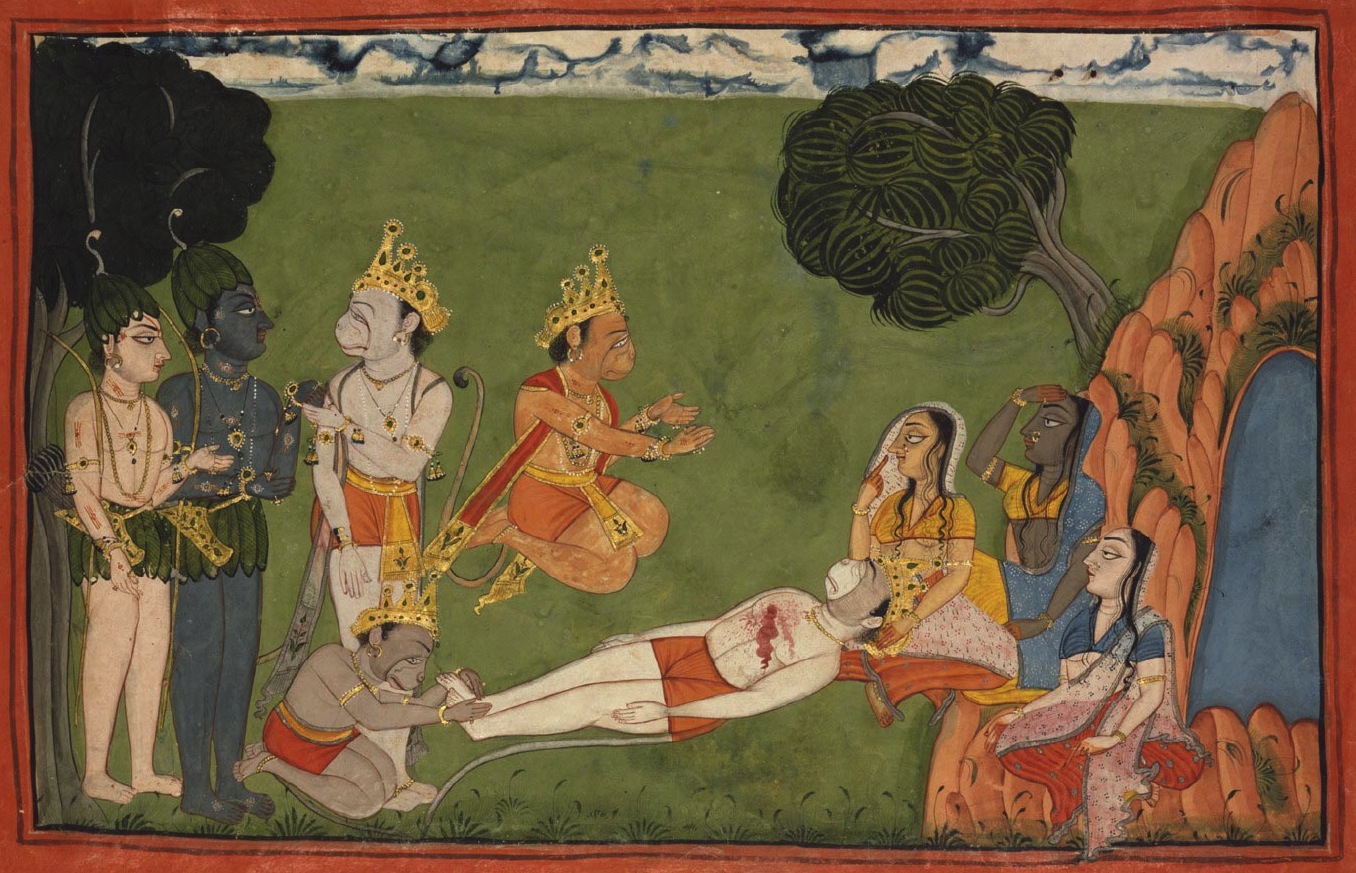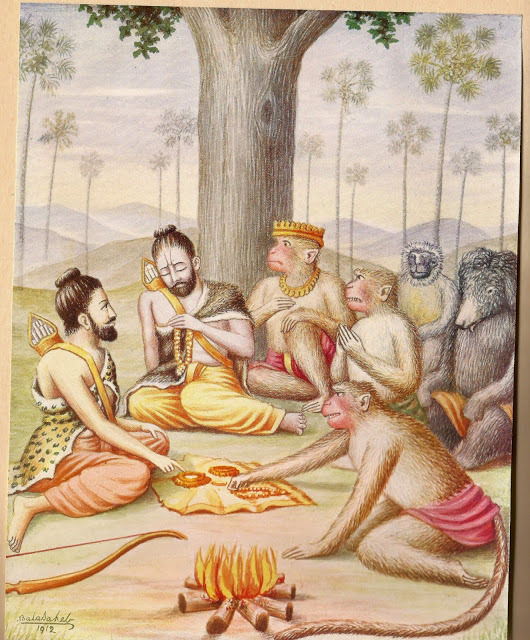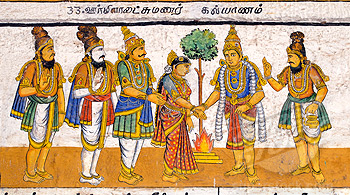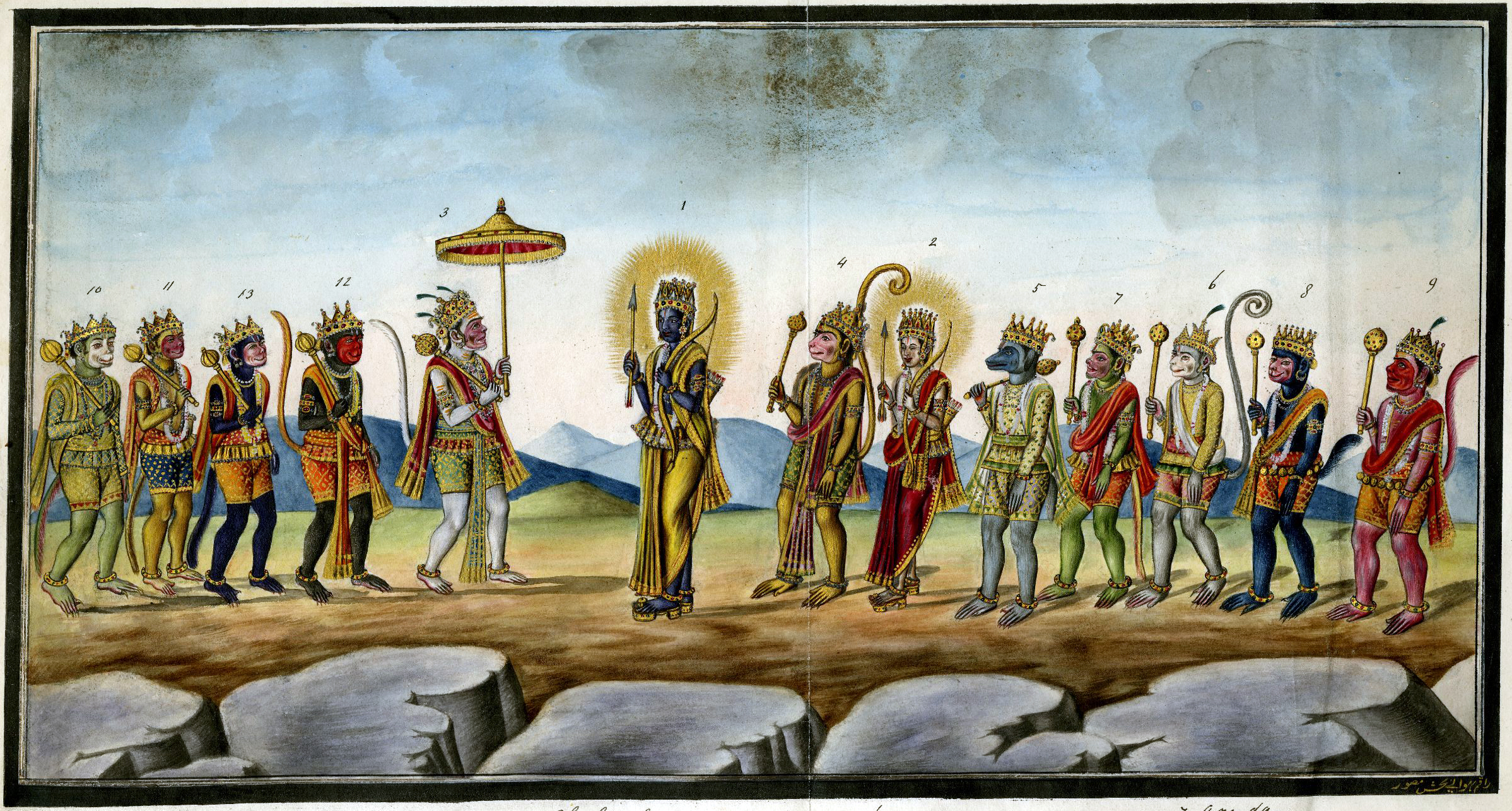|
Angada
Angada (Sanskrit: अङ्गदः, IAST: Aṅgada) is a legendary vanara in Hinduism. He helps Rama find his wife Sita and fight her abductor, Ravana, in the epic Ramayana. He is the son of Vali (Ramayana), Vali and prince of Kishkindha, and is later crowned as the kingdom's monarch. Legend Angada is a son of the powerful vanara king Vali (Ramayana), Bali and his wife Tara. He is the nephew of Sugriva. After Rama and Sugriva kill his father, Angada joins Rama's forces to rescue mata Sita from Ravana's captivity. Angada and Rama are instrumental in reconciling Rama and his brother, Lakshmana, with Sugriva, after the king fails to fulfill his promise to help Rama find and rescue his wife. Together, they are able to convince Sugriva to honour his pledge to Rama, instead of spending his time carousing and drinking. Sugriva then arranges for ''vanaras'' to help Rama and organises the monkey army that will battle Ravana's demonic host. Angada leads the particular search party, ... [...More Info...] [...Related Items...] OR: [Wikipedia] [Google] [Baidu] |
Tara (Ramayana)
In the Hindu epic ''Ramayana'', Tara (, , ) is the Queen of Kishkindha and the wife of the vanara (monkey) King Vali (Ramayana), Vali. After being widowed, she becomes the Queen of Sugriva, Vali's younger brother. Tara is described as the daughter of the vanara physician Sushena in the ''Ramayana'', and in later sources, as an ''apsara'' (celestial nymph) who rises from the Samudra manthan, churning of the milky ocean. She marries Vali and bears him a son named Angada. After Vali is presumed dead in a battle with a demon, his brother Sugriva becomes king and appropriates Tara; however, Vali returns and regains Tara and exiles his brother, accusing him of treachery. When Sugriva challenges Vali to a duel, Tara wisely advises Vali not to accept because of the former's alliance with Rama—the hero of the ''Ramayana'' and an avatar of the god Vishnu—but Vali does not heed her, and dies from Rama's arrow, shot at the behest of Sugriva. The ''Ramayana'' and its later adaptations e ... [...More Info...] [...Related Items...] OR: [Wikipedia] [Google] [Baidu] |
Bali (Ramayana)
Vali () also known as Bali, was a vanara and the king of Kishkindha in the Hindu epic ''Ramayana''. He was the son of Indra, the husband of Tara, the elder brother of Sugriva, and the father of Angada through his wife, Tara. Vali obtained a pendant from his father, Indra, that which allowed him to restore his energy even when nearing death, making him a formidable fighter. He banished his brother Sugriva, who had assumed his throne, believing him to be dead. Sugriva sought the assistance of Rama, an avatar of Vishnu, to intervene in their conflict. During a duel between the brothers, Rama shot Vali in the chest with an arrow. Early life According to the epic, fourteen types of gems or treasures were produced from the churning of the ocean during the time of the Kurma avatar. Among these treasures were various apsaras (divine nymphs), one of whom was Tara. Tara was produced from the churning of the ocean, and Vali, who was assisting his father Indra in the churning, to ... [...More Info...] [...Related Items...] OR: [Wikipedia] [Google] [Baidu] |
Vali (Ramayana)
Vali () also known as Bali, was a vanara and the king of Kishkindha in the Hindu epic ''Ramayana''. He was the son of Indra, the husband of Tara (Ramayana), Tara, the elder brother of Sugriva, and the father of Angada through his wife, Tara (Ramayana), Tara. Vali obtained a pendant from his father, Indra, that which allowed him to restore his energy even when nearing death, making him a formidable fighter. He banished his brother Sugriva, who had assumed his throne, believing him to be dead. Sugriva sought the assistance of Rama, an avatar of Vishnu, to intervene in their conflict. During a duel between the brothers, Rama shot Vali in the chest with an arrow. Early life According to the epic, fourteen types of gems or treasures were produced from the Samudra manthan, churning of the ocean during the time of the Kurma avatar. Among these treasures were various apsaras (divine nymphs), one of whom was Tara (Ramayana), Tara. Tara was produced from the churning of the ocean, an ... [...More Info...] [...Related Items...] OR: [Wikipedia] [Google] [Baidu] |
Sugriva
Sugriva (, ), is a character In the ancient Hindu epic Ramayana. He is the younger brother of Vali (Ramayana), Vali, whom he succeeded as ruler of the vanara kingdom of Kishkindha. He is a son of Surya, the Hindu deity of the sun. As the king of the vanaras, Sugriva aided Rama in his quest to liberate his wife Sita from captivity at the hands of the rakshasa king Ravana. Nomenclature He is also known as , , , , , Creole language, Creole: Soogrim, , , , Sugreeva or Sugreev. Malayalam:Sugreevan. Legend The story of Sugriva is part of Ramayana and in an abbreviated version, is also present in the Mahabharata. The king of Kishkindha, Vrikshraja, was a divine creature born from Brahma's tilaka. He had the body of a human and face and tail of a monkey. He was instructed to roam the forests and kill demons. One day, Vriksharaja entered an enchanted pond, and was transformed into a beautiful lady, attracting the attention of both Indra and Surya. Soon after, they each sired Vali ... [...More Info...] [...Related Items...] OR: [Wikipedia] [Google] [Baidu] |
Lakshmana
Lakshmana (, ), also known as Laxmana, Lakhan, Saumitra, and Ramanuja, is the younger brother of Rama in the Hindu epic ''Ramayana''. He is considered as an incarnation of Shesha, the lord of serpents. Lakshmana was married to Urmila, and is known for his loyalty and dedication towards Rama. Lakshmana was born to King Dasharatha of Ayodhya and Queen Sumitra. Shatrughna, is his twin brother. He was married to Urmila, after his brother Rama married Sita in her swayamvara. Lakshmana devoted himself to Rama since childhood and accompanied him during his fourteen-year exile, serving him and Sita endlessly. He also played a pivotal role in the war and killed Meghanada. Lakshmana is worshipped in Hinduism, at various places in India, alongside Rama and Sita. Etymology The name Lakshmana is of Sanskrit origin, which means 'the one endowed with auspicious signs'. He bears the epithets of Saumitra (, ) and Ramanuja (, ). Legend Birth and early life King Dasharatha of A ... [...More Info...] [...Related Items...] OR: [Wikipedia] [Google] [Baidu] |
Narantaka
Narantaka (Sanskrit: नरान्तक, IAST: narāntaka, lit. ''destroyer of men'') and Devanataka (Sanskrit: देवान्तक, IAST: devāntaka, lit. ''destroyer of Gods'') are asuras and sons of Ravana who appear in a number of Hindu legends. They, along with Atikaya, were the offspring of Ravana and his second wife Dhanyamalini. In the battle of Ramayana, Narantaka was killed by Angada, the son of Bali, whereas Devantaka was slaughtered by the Mace of Hanuman Hanuman (; , ), also known as Maruti, Bajrangabali, and Anjaneya, is a deity in Hinduism, revered as a divine ''vanara'', and a devoted companion of the deity Rama. Central to the ''Ramayana'', Hanuman is celebrated for his unwavering devotio ... in a duel. References Rakshasa in the Ramayana Asura {{Hindu-myth-stub ... [...More Info...] [...Related Items...] OR: [Wikipedia] [Google] [Baidu] |
Vanara
In Hinduism, Vanara () are either monkeys, apes, or a race of forest-dwelling people. In the epic the ''Ramayana'', the Vanaras help Rama defeat Ravana. They are generally depicted as humanoid apes, or human-like beings. Etymology There are three main theories about the etymology of the word "Vanara": * Aiyanar suggests that ''vanara'' means "monkey" derived from the word ''vana'' ("forest"), Literally meaning "belonging to the forest" Monier-Williams says it is probably derived from ''vanar'' (lit. "wandering in the forest") and means "forest-animal" or monkey. * Devdutt Pattanaik suggests that it derives from the words ''vana'' ("forest"), and ''nara'' ("man"), thus meaning "forest man" and suggests that they may not be monkeys, which is the general meaning. * It may be derived from the words ''vav'' and ''nara'', meaning "is it a man?" (meaning "monkey") or "perhaps he is man". Identification Although the word Vanara has come to mean "monkey" over the years and th ... [...More Info...] [...Related Items...] OR: [Wikipedia] [Google] [Baidu] |
Ramayana
The ''Ramayana'' (; ), also known as ''Valmiki Ramayana'', as traditionally attributed to Valmiki, is a smriti text (also described as a Sanskrit literature, Sanskrit Indian epic poetry, epic) from ancient India, one of the two important epics of Hinduism known as the ''Itihasas'', the other being the ''Mahabharata''. The epic narrates the life of Rama, the seventh ''avatar'' of the Hindu deity Vishnu, who is a prince of Ayodhya (Ramayana), Ayodhya in the kingdom of Kosala. The epic follows Exile of Lord Rama, his fourteen-year exile to the forest urged by his father King Dasharatha, on the request of Rama's stepmother Kaikeyi; his travels across the forests in the Indian subcontinent with his wife Sita and brother Lakshmana; the kidnapping of Sita by Ravana, the king of Lanka, that resulted in bloodbath; and Rama's eventual return to Ayodhya (Ramayana), Ayodhya along with Sita to be crowned as a king amidst jubilation and celebration. Scholarly estimates for the earliest stage ... [...More Info...] [...Related Items...] OR: [Wikipedia] [Google] [Baidu] |
Indrajit
Meghanada (, ), also referred to by his epithet Indrajit (), according to Hindu texts, was the eldest son of Ravana and the crown prince of Lanka, who conquered Indraloka (Heaven). He is regarded as one of the greatest warriors in Hindu texts. He is a major character mentioned in the Indian epic ''Ramayana.'' Meghanada is the central character in Bengali epic poem '' Meghnad Badh Kavya''. He played an active role in the great war between Rama and Ravana. He acquired many kinds of celestial weapons from his Guru Shukra. His most prominent feat is having defeated the devas in heaven. Using the Brahmastra, Indrajit killed 670 million vanaras in a single day; nearly exterminating the entirety of the vanara race. No warrior had ever achieved this statistical feat before in the Ramayana. He is the only warrior in the entire Ramayana to defeat both Rama and Lakshmana twice while they were both armed by making them unconscious in a battle with the help of astras and sorcery (once ... [...More Info...] [...Related Items...] OR: [Wikipedia] [Google] [Baidu] |
Vanara
In Hinduism, Vanara () are either monkeys, apes, or a race of forest-dwelling people. In the epic the ''Ramayana'', the Vanaras help Rama defeat Ravana. They are generally depicted as humanoid apes, or human-like beings. Etymology There are three main theories about the etymology of the word "Vanara": * Aiyanar suggests that ''vanara'' means "monkey" derived from the word ''vana'' ("forest"), Literally meaning "belonging to the forest" Monier-Williams says it is probably derived from ''vanar'' (lit. "wandering in the forest") and means "forest-animal" or monkey. * Devdutt Pattanaik suggests that it derives from the words ''vana'' ("forest"), and ''nara'' ("man"), thus meaning "forest man" and suggests that they may not be monkeys, which is the general meaning. * It may be derived from the words ''vav'' and ''nara'', meaning "is it a man?" (meaning "monkey") or "perhaps he is man". Identification Although the word Vanara has come to mean "monkey" over the years and th ... [...More Info...] [...Related Items...] OR: [Wikipedia] [Google] [Baidu] |
Lanka
Lanka (; ) is the name given in Hindu epics to the island fortress capital of the legendary Rakshasa king Ravana in the epics of the ''Ramayana'' and the ''Mahabharata''. The fortress was situated on a plateau between three mountain peaks known as the Trikuta Mountains. The ancient city of Lankapura is said to have been burnt down by Hanuman. After its king, Ravana was killed by Rama with the help of Ravana's brother Vibhishana, the latter was crowned king of Lankapura. His descendants were said to still rule the kingdom during the period of the Pandavas. According to the ''Mahabharata'', the Pandava Sahadeva visited this kingdom during his southern military campaign for the rajasuya of Yudhishthira. The palaces of Ravana were said to be guarded by four-tusked elephants. Ramayana Rulers of Lanka According to both the ''Ramayana'' and the ''Mahabharata'', Lanka was originally ruled by a rakshasa named Sumali. According to Uttara Kanda, Vishwakarma, the divine architect of ... [...More Info...] [...Related Items...] OR: [Wikipedia] [Google] [Baidu] |








